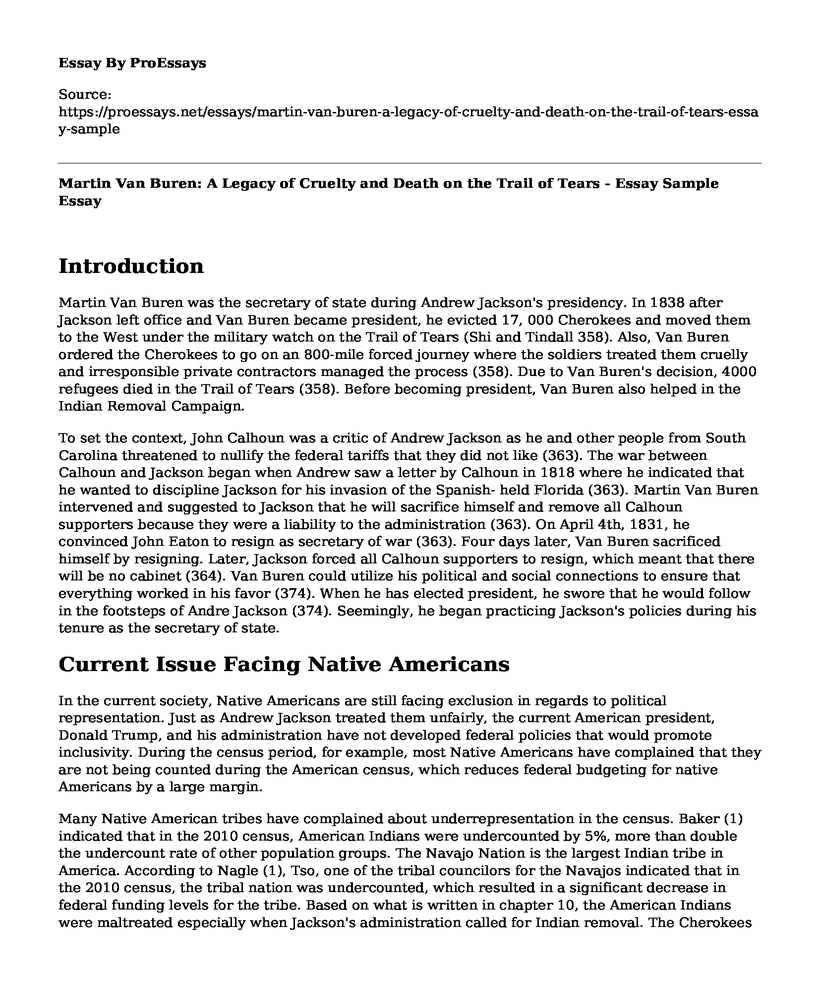Introduction
Martin Van Buren was the secretary of state during Andrew Jackson's presidency. In 1838 after Jackson left office and Van Buren became president, he evicted 17, 000 Cherokees and moved them to the West under the military watch on the Trail of Tears (Shi and Tindall 358). Also, Van Buren ordered the Cherokees to go on an 800-mile forced journey where the soldiers treated them cruelly and irresponsible private contractors managed the process (358). Due to Van Buren's decision, 4000 refugees died in the Trail of Tears (358). Before becoming president, Van Buren also helped in the Indian Removal Campaign.
To set the context, John Calhoun was a critic of Andrew Jackson as he and other people from South Carolina threatened to nullify the federal tariffs that they did not like (363). The war between Calhoun and Jackson began when Andrew saw a letter by Calhoun in 1818 where he indicated that he wanted to discipline Jackson for his invasion of the Spanish- held Florida (363). Martin Van Buren intervened and suggested to Jackson that he will sacrifice himself and remove all Calhoun supporters because they were a liability to the administration (363). On April 4th, 1831, he convinced John Eaton to resign as secretary of war (363). Four days later, Van Buren sacrificed himself by resigning. Later, Jackson forced all Calhoun supporters to resign, which meant that there will be no cabinet (364). Van Buren could utilize his political and social connections to ensure that everything worked in his favor (374). When he has elected president, he swore that he would follow in the footsteps of Andre Jackson (374). Seemingly, he began practicing Jackson's policies during his tenure as the secretary of state.
Current Issue Facing Native Americans
In the current society, Native Americans are still facing exclusion in regards to political representation. Just as Andrew Jackson treated them unfairly, the current American president, Donald Trump, and his administration have not developed federal policies that would promote inclusivity. During the census period, for example, most Native Americans have complained that they are not being counted during the American census, which reduces federal budgeting for native Americans by a large margin.
Many Native American tribes have complained about underrepresentation in the census. Baker (1) indicated that in the 2010 census, American Indians were undercounted by 5%, more than double the undercount rate of other population groups. The Navajo Nation is the largest Indian tribe in America. According to Nagle (1), Tso, one of the tribal councilors for the Navajos indicated that in the 2010 census, the tribal nation was undercounted, which resulted in a significant decrease in federal funding levels for the tribe. Based on what is written in chapter 10, the American Indians were maltreated especially when Jackson's administration called for Indian removal. The Cherokees are also part of Native Americans who have complained about underrepresentation in the census (Baker 1). The exclusion of Native Americans from the census shows that they are still not incorporated as part of American society.
Census data is useful because it helps to gain tribal representation in Congress. Besides Congress, Census information helps Native Americans to receive federal funding that will help them in their daily lives. With the census that will take place this year, political representation appears to be a burdening problem that has affected Native Americans from Jackson's era until today. It is important for the American government to begin considering Native American rights and include them in federal budgets.
Works Cited
Baker, Bill, John. "Cherokee Nation plans for 2020 Census." Skiatook Journal. 2019, www.tulsaworld.com/communities/skiatook/opinion/cherokee-nation-plans-for-census/article_d9b0ff15-8c18-5eb5-b46f-9c61e3adf43e.html
Nagle, Rebecca. "We are still here': Native Americans fight to be counted in US census." The Guardian. 2020, www.theguardian.com/us-news/2020/jan/15/we-are-still-here-native-americans-fight-to-be-counted-in-us-census
Shi, Emory David., and Tindall, Brown George. "The Jacksonian Era 1928-1840." Volume 1, 10th edition. (pp.346-379). W. W. Norton & Company. 2016. Print.
Cite this page
Martin Van Buren: A Legacy of Cruelty and Death on the Trail of Tears - Essay Sample. (2023, Apr 28). Retrieved from https://proessays.net/essays/martin-van-buren-a-legacy-of-cruelty-and-death-on-the-trail-of-tears-essay-sample
If you are the original author of this essay and no longer wish to have it published on the ProEssays website, please click below to request its removal:
- Psychology and Economics in the Hispanic Population Essay
- Effect of Childhood Abuse on Adult Emotional Development Essay Example
- Research Paper on Cyber-Bullying Among College Students
- The Feminism Management Theory and the Practice Management Theory Essay
- Essay Sample on Publius Tacitus: Unveiling the Roman Geography of Germania
- Paper Example on Prevalence and Support for Domestic Violence Survivors Presenting at Emergency Departments
- Black Juveniles of Color: Unwinnable Plights of Sex-Trafficked Kids - Essay Sample







